Three Serbian Songs
by Phil Jones
No, not late entries for the Eurovision Song Contest, but an interesting
survivor from the First World War. The collection bearing this title was
published in 1916 by Collard Moultrie and dedicated to the People of
Serbia.
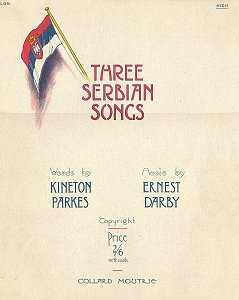 |
The cover bears the Serbian flag and the names of the two
composers, namely: words by Kineton Parkes, music by Ernest
Darby. The titles are based on Serbian poems, being "Lado", "The
Defender" and "The Plum Tree".
The discovery of this music, and other historical records, has
shed new light on the origins of the Wolverhampton School of
Music.
|
| At the turn of the century, Kineton Parkes was the
Principal of the Nicholson Institute at Leek. He was a lecturer,
writer, art critic, and an expert on the silk industry of Leek and
Macclesfield. He was also a leading light in the social and artistic
life of Leek.
In 1899 the Leek Amateur Operatic Society staged a production
of "Iolanthe'", one of the popular Gilbert and Sullivan
Operettas.
Kineton was Acting Manager, as well as taking the lead role of
Lord Chancellor. Mrs Parkes was the Fairy Queen and, completing
the family participation, the role of Leila was taken by
Kineton's younger sister, nineteen year old Florence. |
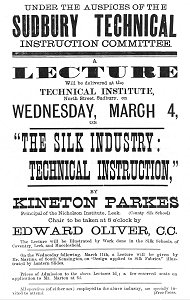 |
|
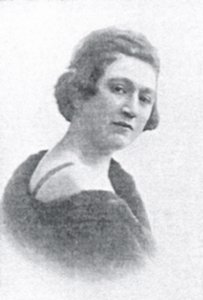 Florence Parkes Darby.
Florence Parkes Darby. |
Florence Parkes had talents for singing and piano
playing and these were encouraged by Kineton from an early age. They
were two of six children of William Parkes, who was employed in the
Birmingham jewellery trade, and were all born in Birmingham.
Florence’s talents were also encouraged by Mr Henry Wood (the
founder of the Proms and later Sir Henry Wood), who in 1900
became Guest Conductor of the Wolverhampton Festival Choral
Society. Mr Wood had suggested that Florence pursue a singing
career in London.
However this was disregarded because, in 1902, Florence had
met Ernest Darby. |
| Ernest Darby was a son of John Darby, a
Wolverhampton solicitor who, in turn, was a descendant of Francis
Darby (brother of Abraham). Born in 1873, Ernest was educated at
Wolverhampton Grammar School and went on to study Music at Durham
University.
With the award of a Doctorate, Ernest began a career teaching
music in Chapel Ash. In 1899 he was appointed Organist and
Choirmaster at St Marks Church.
In 1902 Ernest was planning to stage an amateur operatic
production at the Grand Theatre. The work chosen was "The
Bohemian Girl" by Balfe. This work, never as popular as the G&S
operettas, is best known for the Aria "I dreamt I dwelt in
Marble Halls". The talented Florence Parkes became an automatic
choice for the soprano role in this production. |
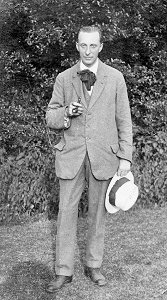 Ernest Darby.
Ernest Darby. |
|
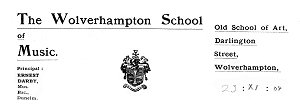 The School's letterhead in its early
days.
The School's letterhead in its early
days. |
Florence joined Ernest to develop the School of
Music, which was initially based in rooms at the old Art School in
Darlington Street. |
| They were married at St Marks in 1904 and the
honeymoon was taken in North Wales.
One interesting detail is that, on their return, they were
present at the laying of the foundation stone at the Anglican
Cathedral in Liverpool. |
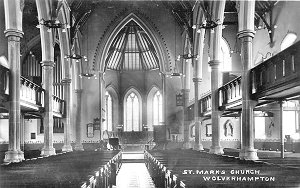
The interior of St Marks,
from an old postcard. |
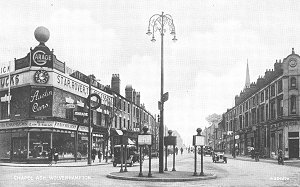 Chapel Ash from a postcard of about
the 1930s. The studios were on the right.
Chapel Ash from a postcard of about
the 1930s. The studios were on the right. |
As the Wolverhampton School of Music developed, it
transferred to permanent studios at 27, Chapel Ash. In 1907, as a
means of putting theory into practice, the two established the
Wolverhampton Opera Company. This was to be an amateur organisation,
with funds being raised for various good causes. Every year a
production was mounted in Wolverhampton, usually at the Grand
Theatre. |
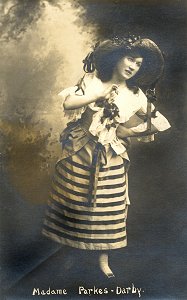 |
These two postcards probably
relate to one of the productions at the Grand. The card on the
right has "Dorothy -Lydia" pencilled on the back. Presumably
this was a production of the comic opera "Dorothy" by B. C.
Stephenson (book) and Alfred Cellier (music), first performed in
1886 and running for 931 performances at the Gaiety, it would be a
typical production for an amateur opera company. |
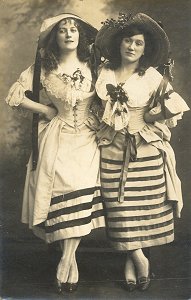 |
| During the First World War, the activities of the
WSM were reduced. Dr Darby had volunteered as a Special Officer with
the local Police Force. By 1923, the School had returned to normal
and entered a period of consolidation. |
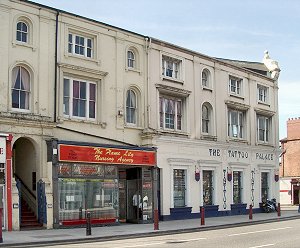
27 Chapel Ash today, now
occupied by the Flame Lily nursing agency. |
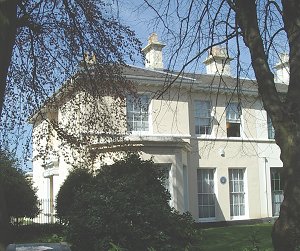 7 Summerfield Road today, with the
blue plaque commemorating the Darbys between the windows.
7 Summerfield Road today, with the
blue plaque commemorating the Darbys between the windows. |
During 1932 a move was made to the "Marble Halls" of
No 7 Summerfield Road, close to West Park.
This was one of a pair of houses built in 1840 and is well
illustrated and described in the book "The Fowler Legacy" by Anthony
Perry. As well as being the Studios of WSM, No 7 was also the family
home.
|
|
The Darbys had two sons, John Kineton (named after Ernest's father and
brother-inlaw) and Ludwig (named after his favourite composer
Beethoven). The only daughter, Vaudrey, was born in 1912. The name was
taken from the heroine in the novel "The Altar of Moloch" written by
Kineton Parkes and published in that year.
After gaining LRAM, Vaudrey helped out with taking classes at the WSM,
in Singing and Piano.
In 1933 the family was involved in the production of "Merrie
England" in West Park. This was followed in 1935 with the
"Jubilee Pageant" and "Pied Piper of Hamelin" at Molineux
Football Ground. |
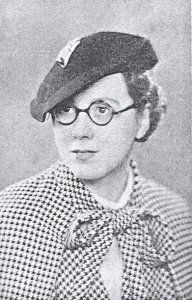
Vaudrey Darby. |
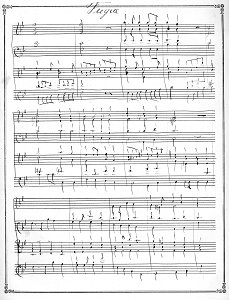 A page from a mss book of Dr. Darby
containing a setting of the 93rd psalm and this Fugue.
A page from a mss book of Dr. Darby
containing a setting of the 93rd psalm and this Fugue. |
In addition, the Operatic Company was still mounting
its annual production at the Grand Theatre. Dr Darby was the Musical
Director and Business Manager; Madam Parkes-Darby was Producer and
Principal Soprano.
With the illness of Dr Darby in 1936, Madam took over as
Director of the production of "Rose Marie". Vaudrey took over the
Soprano role, with her brother John taking over technical
supervision.
Ernest died in January 1937 from a cancer of the leg. The letters
received at No 7 demonstrated that Dr Darby was a much loved and
respected member of local society.
At the Memorial Service, held at St Marks Church, the Choir sang
his arrangements of the "Magnificat" and "Nunc Dimittis". |
| The outbreak of the Second World War again
interrupted normal activities. Florence and Vaudrey undertook
entertainment of employees at local ordnance factories and at local
Forces Clubs.
WSM Classes resumed at No 7 after the War, with Florence and
Vaudrey. However the Opera Company was not recommenced. The last
production had been the 1938 show "Vagabond King". However by
1950 light opera was already well established in Wolverhampton.
Other Societies, such as Willenhall Wesley, carried on the
tradition into the post-war years.
|
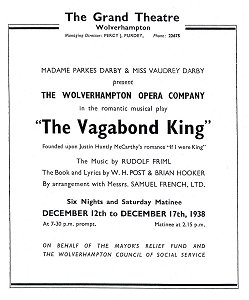 |
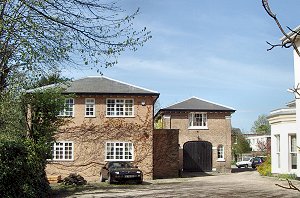 The Garden House and the Coach House
with a corner of 7 Summerfield Road. (Thanks to Geoff Johnson
for permission to enter and photograph).
The Garden House and the Coach House
with a corner of 7 Summerfield Road. (Thanks to Geoff Johnson
for permission to enter and photograph). |
Over the next thirty years Florence and Vaudrey
continued at No 7, with Vaudrey gradually taking over the classes.
Following the death of Florence in 1976, the decision was made
to sell No 7 and build an extension to the Coach House known as
'Garden House'.
In the Studio overlooking the garden Vaudrey continued teaching
piano and singing for another 25 years. By 1978 the records of the
School of Music and the Opera Company had been deposited in the
Borough archives. |
| 1978 also saw the closure of St Marks Church, prior
to its conversion to financial offices. With the transfer to St
Marks annexe, Vaudrey stepped in as pianist to accompany services.
It was decided to transfer the organ from St Marks to Wolverhampton
Grammar School, where Dr Darby had been an occasional teacher of
Music.
As a memorial to Dr Darby, a decorative carved surround had
been installed, with Gothic style drawers. This had previously been
dedicated at a service held by Rev Holmes Walker (then Vicar at St
Marks). On this occasion the Choir included "Kyrie" and "Jubilate"
sung to Dr Darby's arrangements. The organ (with its surround) is
still located at the School. |
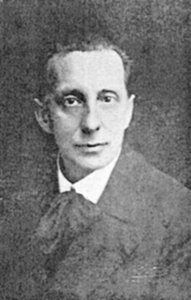 |
With the WSM Records deposited at Snow Hill in 1978 was included most
of Dr Darby's compositions. There is no catalogue of this work and
producing one would represent a major project for a local musicologist,
to sort out the pieces and compositions worth a second look. Dr Darby is
not included in the recently published definitive list of British
composers, though it is hoped eventually to remedy this omission.
Perhaps one day we will hear again some of Dr Darby's work. To start the
process, I have a photocopy of "Serbian Songs" available to any choir or
group wishing to try it out.
The School of Music came to an end in 2001 when Vaudrey Darby died on
the 10th May that year, after a fall at home. Like her father
previously, she had been taking lessons in Summerfield Road, and
accompanying Services at St Marks, until just a few days before her
death. This was a few months before her ninetieth birthday and marked
the end of almost a century of musical education in Wolverhampton.
The blue plaque on the wall of No7 Summerfield Road commemorates the
work of the School of Music. Describing the Darbys as "Musicians" is
something of an understatement. The following CVs show what an important
contribution was made by the Darby family to the musical and social life
of Wolverhampton.
George Ernest Darby, Mus. Doc. (Dunelm), ARCO, Hon RCM, MRST (1873 -
1937)
Founder and Director, Wolverhampton School of Music. Founder and
Musical Director, Wolverhampton Opera Company. Organist and Choirmaster,
St Marks Church, Chapel Ash. Composer of works for St Marks Choir, organ
and orchestral groups. Conductor, Wolverhampton Choral Society. Tutor,
Orchestral Class at Wolverhampton Technical College. Vice President,
Wolverhampton and District Organists and Choirmasters Association.
Madam Florence Parkes-Darby, LRAM, ARCM, MRST (1880 - 1976)
Founder and Director, Wolverhampton School of Music and WOC. Teacher in
Drama and Elecution. Tutor, Opera Class, at Wolverhampton Technical
College. Member of Advisory Committee, British National Opera Company.
Founder, secretary and past President of Wolverhampton Inner Wheel.
Miss Vaudrey Darby, LRAM (1912 - 2001)
Director of Wolverhampton School of Music. Teacher of piano and
singing.
|


 Florence Parkes Darby.
Florence Parkes Darby. Ernest Darby.
Ernest Darby. The School's letterhead in its early
days.
The School's letterhead in its early
days.
 Chapel Ash from a postcard of about
the 1930s. The studios were on the right.
Chapel Ash from a postcard of about
the 1930s. The studios were on the right.


 7 Summerfield Road today, with the
blue plaque commemorating the Darbys between the windows.
7 Summerfield Road today, with the
blue plaque commemorating the Darbys between the windows.
 A page from a mss book of Dr. Darby
containing a setting of the 93rd psalm and this Fugue.
A page from a mss book of Dr. Darby
containing a setting of the 93rd psalm and this Fugue.
 The Garden House and the Coach House
with a corner of 7 Summerfield Road. (Thanks to Geoff Johnson
for permission to enter and photograph).
The Garden House and the Coach House
with a corner of 7 Summerfield Road. (Thanks to Geoff Johnson
for permission to enter and photograph).
